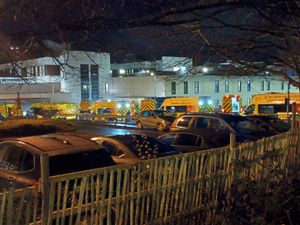'Significant flaws' in UK's ability to handle pandemics and global IT outages - Pat McFadden
MPs heard the report painted a ‘stark’ picture on the condition of public services.
There are “significant flaws” in the UK’s ability to prepare for major events like a pandemic or the most recent global IT outage, MP Pat McFadden has warned.
He vowed to improve the UK’s “national resilience” after the UK Covid-19 Inquiry found there were “significant flaws” in preparing for a pandemic.
The Chancellor of the Duchy of Lancaster also pointed to the IT outage as he said he would lead a review of the country’s “national resilience against the range of risks that the UK faces”.
Mr McFadden, the MP for Wolverhampton South East, painted a “stark” picture of the condition of public services.
The inquiry, chaired by Baroness Heather Hallett, said there was a “damaging absence of focus” on the measures and infrastructure that would be needed to deal with a fast-spreading disease, even though a coronavirus outbreak at pandemic scale “was foreseeable”.
Mr McFadden said: “We can only begin to imagine the anguish and the anger that people feel, because this report confirms what many have always believed: that the country was not as prepared as it should have been. That more could and should have been done.”
He added: “The underlying picture this report sets out is stark. Before the pandemic began our public services were already stretched to their limit during what should have been normal times. This was especially true of the NHS.
“Overstretched even before the pandemic hit, key workers in other services, overburdened in normal times, were then asked to go above and beyond.
“A nation can only be as resilient as the foundational strength of its infrastructure and public services.
“So as I stand here today, with eight million people on NHS waiting lists, prisons overflowing, councils pushed to the brink and public services in a worse position than they were even in 2020, we must ensure that we are prepared.”
Mr McFadden said Friday’s global IT outage was a reminder of the importance of learning the lessons from the pandemic.
He told MPs: “Baroness Hallett says it’s not a question of if another pandemic will strike, but when, and resilience isn’t just about another pandemic but the full range of risks that we face.
“And we’re reminded of that this morning as reports come in of a global IT outage affecting airlines, GP surgeries, banks, media organisations and other organisations.
“It is not easy to know what the future holds. You can’t plan fully for every possible risk. But we must do what we can to learn the lessons of this period.”
He acknowledged the Government’s first responsibility is to keep the public safe, adding: “That’s a top priority for this Government with a long-term approach to strengthening our national resilience.
“I will lead a review of our national resilience against the range of risks that the UK faces. I’ll chair a dedicated Cabinet committee on resilience to oversee that work.
“And of course, it’s not just about central Government. We will work with the devolved governments, our regional mayors and local leaders as we consider the recommendations in this report. Because when we have an emergency, we should do everything we can to work together locally and nationally.”
For the Conservatives, shadow justice secretary Edward Argar said the Government and others must learn from their mistakes during the Covid-19 pandemic, “however painful those lessons may be”.
He said: “What we have seen set out today by (Mr McFadden) and by Lady Hallett yesterday is deeply sobering.
“It lays bare failures of state in respect of planning, in respect of challenge, in respect of resourcing and in respect of leadership, and irrespective of government or party in power, it is incumbent on all of us to look at that in the spirit in which Lady Hallett has put forward her recommendations.”
Conservative MP Mike Wood (Kingswinford and South Staffordshire) asked about the Government having access to the “widest possible range of advice” including “where appropriate dissenting voices” across different issues.
Mr McFadden replied: “Groupthink is one of the things identified in the report so it is important for the Government to have access to the widest range of advice, but no part of that on my part of the Government’s part will be engaging in anti-science rhetoric or anything of that nature.
“A diversity of views, yes. A denial of the facts, no.”


